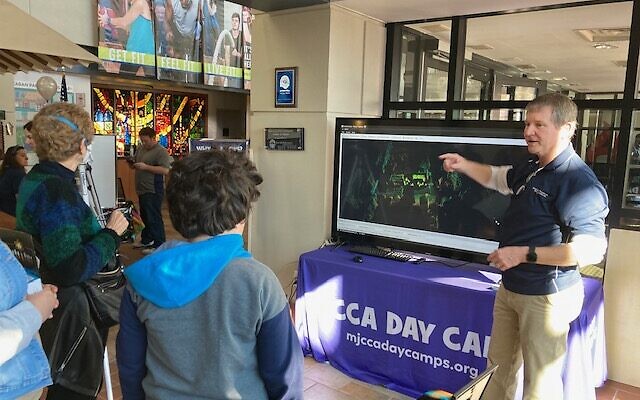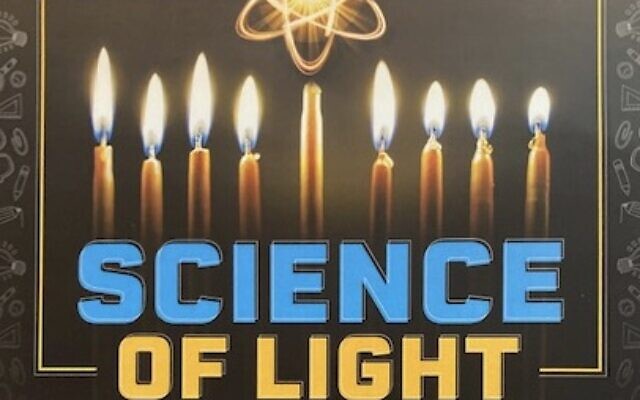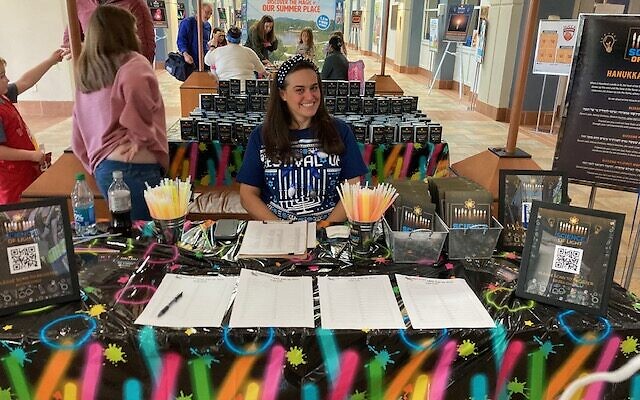MJCCA Lights Up the Science of Chanukah
Experiential program about the science of light is featured just before the lighting of the first candle of the holiday.
Light, in all its many forms, was the theme of a special Chanukah program just before the start of the holiday at the Marcus Jewish Community Center of Atlanta in Dunwoody. The children’s program, called “Science of Light,” explored not just the light that is generated by the candles or oil of the Chunukah menorah, but neon, lasers, LEDs, incandescent bulbs and even the bioluminescence generated by living creatures.
The initiative was the second in a series of programs at the MJCCA in experiential learning created by Kelly Cohen, who has directed the program that began with a Sukkot celebration in October.

Participants were given boxes of Chanukah candles imprinted with the center’s Science of Light logo and enjoyed complimentary jelly- and custard-filled donut holes. Everyone also received a color booklet that mentioned the 10 forms of light that were highlighted in the event, as well as the blessing for the Chanukah candles.
Cohen envisioned the afternoon program as a way of broadening the understanding young persons have about the Jewish holiday of light.
“We wanted to give children a way of thinking about the holiday in a way that focused on what is essential about the holiday,” Cohen said. “Chanukah is a holiday about light, and we tried to think about how we can give people a hands-on experience with what is essential about the holiday.”

One of the participating organizations in the afternoon was Nurture, which was started by The Davis Academy, the Jewish day school in Dunwoody. It involves preschoolers and their parents on weekend learning opportunities. At the MJCCA, the director of the program, Amy Helman-Darley, helped youngsters create what are called “squishy circuits” with Play-Doh and battery-powered circuits that lit up when they were assembled. Children were also able to explore light in nature and the shadows that light creates as it moves across the sky each day.
The MJCCA event was also an opportunity to sign up parents for Nurture, which is open to the entire community. Last month, the organization hosted an author talk and book signing of “Good Inside: A Guide to Becoming the Parent You Want to Be,” an evening in partnership with the Book Festival of MJCCA. The program attracted more than 500 parents to hear about new approaches to parenting strategies.
For program director Helman-Darley, the Chanukah program was a way to help encourage what she describes as the innate curiosity that preschoolers have for the world around them.
“There’s a curiosity that comes at their age. They’re willing to explore and willing to make things that may not always work. Sometimes, the squishy circuits don’t work, but then, they keep trying. And then, finally, it lights up. There’s the excitement of trying and trying again until something works. And I think that’s the beauty of being young,” she said.

For older children, there was a high-tech display from the Georgia Tech Research Institute of the many ways that light facilitates other technologies, such as the fiber optic labeling that enhances the internet.
There were three cameras attached to a large video display that presented ultraviolet light images, thermal infrared light images and visible light images. A senior research scientist, Jack Wood, who works with the Institute’s technology outreach program, talked about how laser light is the key to the bar code technology used in retailing and supermarkets and how spectrum tubes filled with various gases can be analyzed by the kind of light they give off.
Wood’s work is patricianly funded by the state of Georgia STEM program that encourages students to learn about science, technology, engineering and mathematics. While the hope is that some students will choose a career in these areas of learning, the goal is broader.
“We’re really after creating critical thinkers so that students can grow up and become adults who appreciate science and the things that the technology gives us. But also, to ask a good question and understand sources of information and whether they’re true or not,” Wood said.
The afternoon concluded with the lighting of the MJCCA’s menorah on the first night of Chanukah, which, as Cohen pointed out, is another example of experiential learning and the transmission of religious values in Judaism.
“Everything that we’re doing kind of gives the participants an opportunity to think about light in a different way and engage with light in a different way. This is a season of miracles. And I think, our afternoon about the Science of Light is a very cool way to think about this holiday.”
- Community
- Local
- Bob Bahr
- Marcus Jewish Community Center of Atlanta
- Science of Light
- Chunukah
- Menorah
- neon
- lasers
- LEDs
- incandescent bulbs
- bioluminescence
- Kelly Cohen
- Sukkot
- Nurture
- The Davis Academy
- Amy Helman-Darley
- Play-Doh
- Good Inside: A Guide to Becoming the Parent You Want to Be
- Book Festival of MJCCA
- Georgia Tech Research Institute
- Jack Wood
- STEM




comments